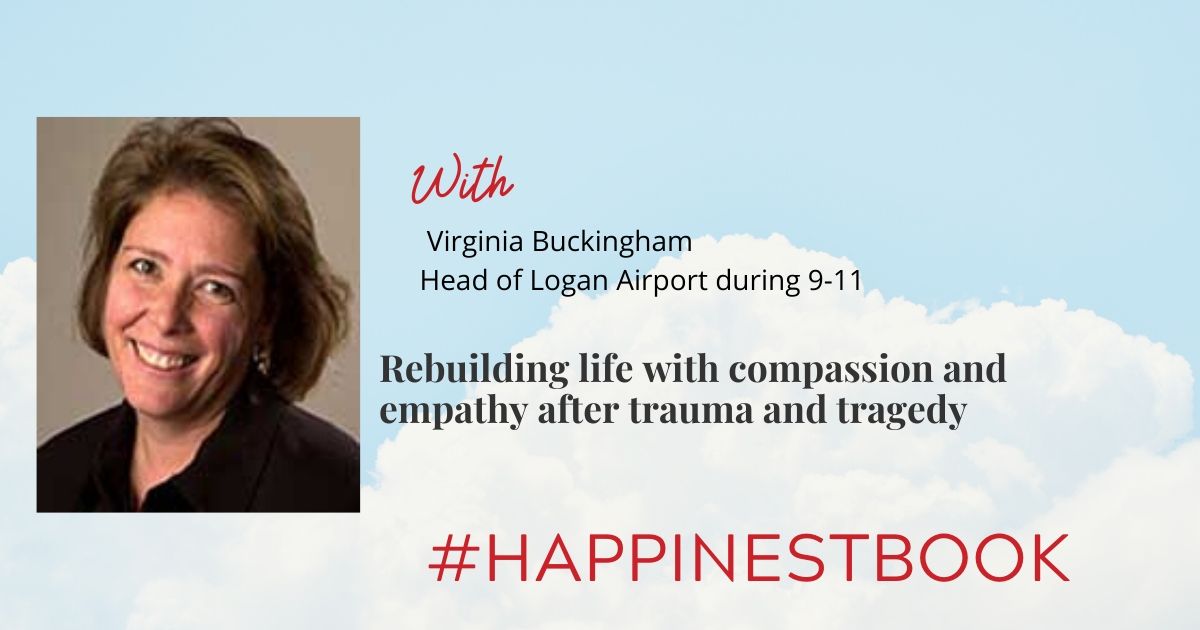At the time of the World Trade Center attacks, Virginia Buckingham was head of Boston’s Logan Airport, which became the launching pad for the two hijacked planes that destroyed the World Trade Center on 9/11. She was blamed for security flaws at Logan in the worst terrorist attack on American soil. She was forced to resign and sued by a 9/11 victim’s family for wrongful death. But she was able to rebuild her life and career and glean valuable lessons along the way. She writes about her journey in her new memoir, On My Watch. Virginia says she discovered an important difference between moving on and moving forward. She says she eventually got found a way to get back on her feet by showing—and receiving—compassion and empathy.
If you like what you hear, I’d really appreciate it if you would subscribe, rate and review the show. It’s easy to do on Apple Podcasts, or you can go directly to the podcast section of my website at judyhollandauthor.com.
Here’s what you’ll learn about in this episode:
- Virginia was 35 years old and caught up in a media firestorm two days after the 9-11 attacks because she headed Logan Airport, where the two hijacked planes that hit the World Trade Center originated. Six weeks later, she was forced to resign.
- After having served as chief of staff to two Massachusetts governors, and risen to head the Massachusetts Port Authority, the firing shattered her sense of self. She began to internalize the blame and wonder if she had been at fault. That doubt hung over her for many years.
- After a year at home, she became an editor and columnist at the Boston Herald, pressing on even though many journalists publicly opposed her hiring.
- Virginia pushed away the pain, blame and trauma at first. It was only after she allowed those feelings to come back and to experience them again that she began to heal.
- People told her to just move on. To slam the door. Instead, she used the pain as a foundation of what she was becoming. Only then was she was able to move forward.
- Virginia says she will carry the 9-11 story and parse its lessons forever. But she is still determined to live a life of meaning and joy.
- For a long time, Virginia says she was failing at resilience. She felt a lot of shame. She now envisions resilience in the metaphor of a sea glass that is tumbled apart in tunnels of waves and becomes a beautiful sparkling piece of glass that can bring meaning and joy to others.
- Virginia moved from her newspaper job to Pfizer, one of the world’s largest pharmaceutical companies. She commutes from Boston to New York City during weekdays (except during the pandemic). She is open to taking chances and believes that will lead her somewhere great.
- She was honest with potential employers about her past. “People respect authenticity. If you can just tell your story, I’d say nine times out of 10, you’ll be welcomed and appreciated for that.”
- For years, Virginia looked for external validation and stopped listening to herself. She says accepting that you’ve been changed forever by events is, is something that will give you the heart and strength to move forward.
- She says most people don’t bounce back from trauma. They move forward. That’s a slower, more thoughtful and more deliberative process.
- We should all try to have more compassion and empathy for each other. That will bring us together.
- You can get to a better place from a really bad place. It takes time. But it’s hard to see in the moment.
- Take a breath. Reflect. Is this your path? Perhaps there’s another more rewarding one you want to follow.





